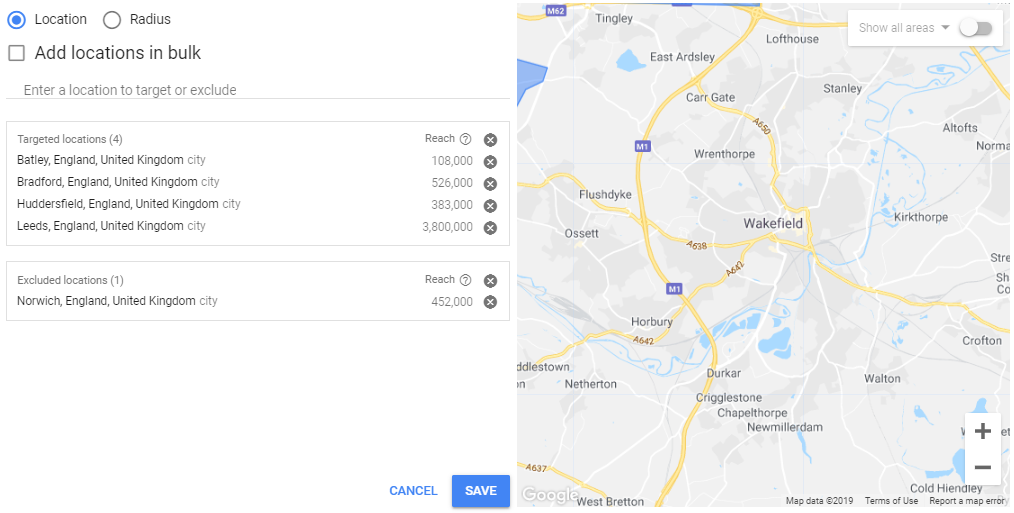Nine Ways To Improve Your Local PPC Ad Campaigns
What is local PPC?
Local Pay Per Click (PPC) is a paid advertising strategy designated to target potential customers in a specific geographic area.
The main ingredients of a local PPC strategy are:
- Keywords
- Geo-targeting
- Local ad copy
- Location extensions
If you offer services to a specific set of locations, or even more, to specific postcodes, then local PPC is the digital advertising strategy to go for. To illustrate, if you offer waste collection services in Leeds, you will want to target users located in LS postcodes and waste collection related keywords containing LS postcodes.
The reality is, targeting keywords, internationally or nationally, can be a costly approach and a challenging playground to compete in. The proximity to a local market is what gives you the advantage over more prominent players. This blog encompasses tips and tricks on how to excel at local PPC.
Identify profitable products/services
Firstly, identify which products or services generate the most revenue for your business and which are the most profitable. If you do not have the budget to promote all your products, focus on the ones with the highest chance to deliver a successful PPC campaign.
Review campaign performance
If you are already running PPC ads, investigate your campaign statistics, and derive information from which keywords are getting you the most impressions. The next step is to cross-check these keywords with your product or service range.
If you identify matches of high impressions for keywords that are also your profitable products or services, but that have a low Click Through Rate (CTR), create specific ad groups for them. This will allow you to create a more targeted ad copy for these keywords. This will hopefully improve your CTR.
Structure campaigns
Organise your PPC campaigns by creating city-focused keywords in their ad groups and ad copy. This has the potential to lead to a higher Quality Score, CTR, and conversion rate. Your goal is to have granular control over your campaigns.
No two markets are identical, as the level of competition, population, and search volume are different. Therefore, you should have location-specific goals. A well-structured campaign will enable you to monitor your PPC spending closely.
Competitor research
Know your competitors and what local PPC strategies they are using. For competitor research, use tools such as SEMrush, SpyFU, Keyword Spy, and KeywordCompetitor. Also, view your competitor ads – what format, language, keywords, and ad extensions are they using? All these questions can be quickly answered by looking up their ads on Google Search results.
Keyword targeting
Target long-tail keywords, as they will have a more affordable cost per click as well and will bring a more relevant audience.
Tracking
Set up tracking to be able to measure your ad performance and impact. Basic features are available on Google Analytics. Another option is to use the conversion tracking method offered in Google Ads. This requires a snippet of code to be placed on a specific area of your website.
The conversion reporting provided by Google Analytics and Google Ads can be different, and each has its benefits and drawbacks. We’ve written about this subject before, so take a look at our previous post if you want to know more about the differences between Google Analytics and Google Ads conversions Tracking and seeing the performance of your campaigns and keywords will enable you to optimise your keyword bids further.
Optimise landing pages and ad copy
Try A/B testing and improve your ad copy. Include a postcode in the ad copy and display the URL. Numbers attract attention if they apply to your customer.
Similarly, to improve ad copy, make sure the landing pages associated with your ads are informative, action provoking, and easy to navigate. Localise your landing pages by using images of local team/customers, showcasing local awards, and any local knowledge that backs up the regional focus of your ads.
Geo-targeting
Use the advanced location option to select a specific radius you would like to target, for example, a 30-mile radius around Sheffield if you only want to attract customers around this location. Alternatively, you can add locations in bulk, meaning that you will add specific towns or cities you would like to target.
Once you type in a target location, you will be able to see the potential number of people in or interested in that location. Additionally, you can exclude locations and add nearby locations.

Location extensions
Create local call outs and site links by including location name in the link text. Location extensions use the information from your Google My Business listing, such as address and phone number.
By using local ads, you could potentially benefit from more visits to your business, an increased amount of calls, and the ability to provide searchers with more information about your organisation, such as opening hours and reviews.
Succeeding with Local PPC advertising is very different to succeeding with large budget PPC advertising. We have vast amounts of experience working on local PPC campaigns. To find out more or to request a free PPC account audit to see how we can grow your PPC sales, get in touch here.